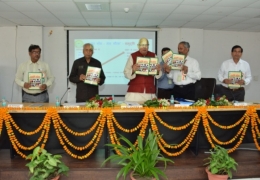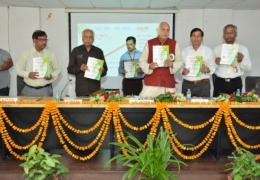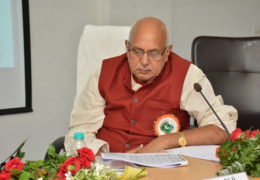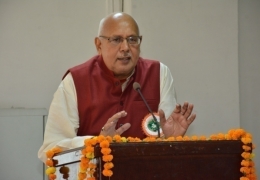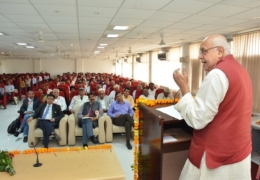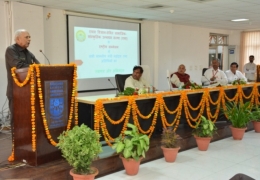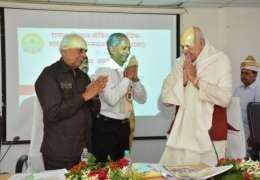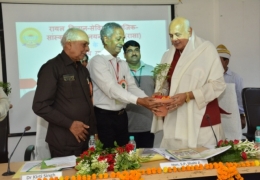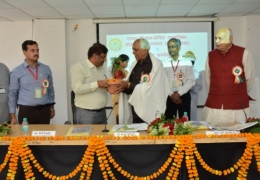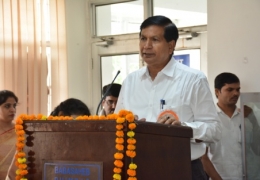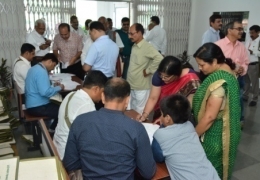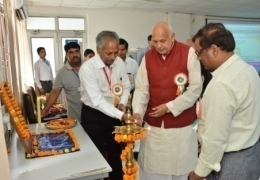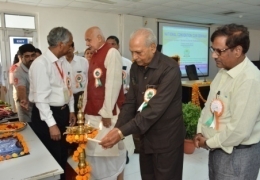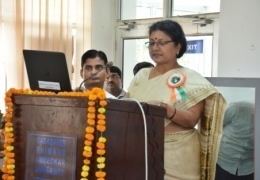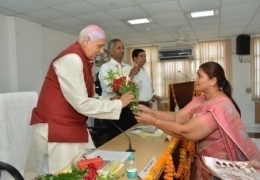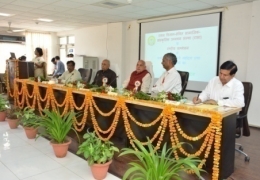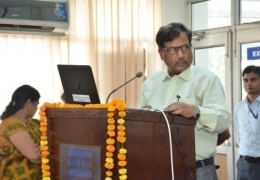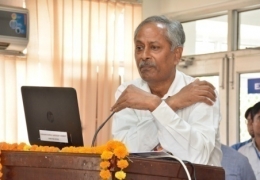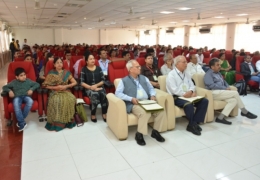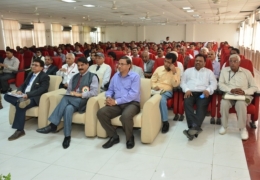Seminar
RASSA organised the first National Seminar-cum-Convention at Baba Saheb Bhimrao Ambedkar University, Lucknow from 28th to 29th October, 2017. The main focus of the seminar was on “Doubling Farmers’ Income and Farm Profitability by 2022’. Following sub-themes of the seminar were discussed by presenting papers/discussions with policymakers, scientists, industries and farmers:
- Designing crop management practices to improve factor productivity, enhancing farm income and profitability
- Diversification to high-value agriculture including horticulture fisheries, Animal husbandry, beekeeping, mushroom and other allied etc
- Conservation agriculture
- Technological applications for rainfed and dryland agriculture
- Organic farming
- Value addition
- Secondary agriculture for increasing farmers’ income
- Climate-smart system
- Reducing cost of cultivation
- Reduction in post-harvest losses
- Role of ICT
- Agricultural extension and role of KVKs
- Role of private agencies and corporate sectors
- Policy issues
The Inaugural Session was chaired by Prof.Kirti Singh, Former ASRB, Chairman, ICAR, New Delhi. Er Awadhesh Kumar Singh, President RASSA, Dr Rana Pratap Singh, President RASSA Uttar Pradesh and Dr Jyotslendra Singh, Convener of Seminar also shared the Dias. The Chief Guest of the Seminar was Hon’ble Minister of Agriculture Sri Surya PratapShahi Ji. President RASSA UP welcomed the Chief Guest, dignitaries, participants, press-media and farmers. RASSA President briefedabout vision and mission of RASSA. President RASSA in the deliberation also presented a model forthedevelopment of society on the foundations of self-respect, equality and partnership for specialization of a goal of clean, healthy, educated, fearless and competent society. While inaugurating the seminar the Chief Guest presented the brief scenario of agriculture in the state and stressed the need to popularise organic farming among farmers for quality produce. Chairman of the session highlighted the status oftheprevailing agricultural system.
The Keynote Address was also chaired by Prof Kirti Singh, Former ASRB, Chairman, ICAR, New Delhi. Dr S K Malhotra, Commissioner Agriculture, Govt. of India and Prof Nagendra Kumar Singh, National Professor & BP Paul Chair delivered keynote addresses on Approaches in Transition for Doubling Farmers’ Income and Role of advance Biotechnologies for enhancing Farm Productivity, respectively.
The Lead Paper Session was chaired by Prof Sita Ram Singh, Former Vice-chancellor, RAU, Pusa, Biharandco-chaired by Prof Bachchan Singh, Former Dean, College of Technology, GBPUAT, Pantnagar. Dr.Narendra Pratap Singh, Director, ICAR-NIASM, Baramati, Dr.Satyendra Kumar Singh, Joint Managing Director, BhoomiSudhar Nigam, Lucknow, Dr.Jaswant Singh, Former PS & Head, ICAR-IISR, Lucknow, Dr. Ramesh Singh, Head, Penshiabao Wang Pvt. Ltd., New Delhi, Dr. Rana Pratap Singh, Professor & Dean, Academic Affairs, BBAU, Lucknow, Dr. V K Singh, Head, Agronomy, ICAR-IARI, New Delhi, Dr. B N Singh, Chairman, Dr.Abha Singh, Professor & Head, NDUAT, Faizabad and Dr. R C Srivastava, Vice-chancellor, presented lead papers on Abiotic Stress Management for Maximising Crop Productivity and Farmer’s Income, UP Arable Wasteland Management and Climate Resilient Agriculture Project, Mechanization, a Viable Option for Cultivation and Processing of Sugarcane for Increasing Income and Profitability,Biopesticides: A Safer Alternative for Farmers., Emerging Issues and Challenges of Rural Development and Plant Agriculture in Era of Climate Change, Farming Systems Approach for Doubling Farm Income of Small Holders, Doubling Farmer’s Income in Submergence and Drought Prone Areas, Improving the Life of Women in Rural Sector for Doubling Their Income, and Doubling the farmers income and actionable approach, respectively.
An Interaction Session of farmers with scientists and industry people was also organised. The session was chaired by Dr U S Gautam, Director, ICAR-ATARI, Kanpur. Farmers were educated to enhance their farm’s productivity and profitability.
Technical Session was chaired by Dr Narendra Pratap Singh, Director, ICAR-NIASM, Baramatiand co-chaired by Dr Brajesh Singh, Head, Division of Crop Physiology, Biochemistry and Post-Harvest Technology, CPRI, Shimla. Dr Rudra Pratap Singh, SMS (Plant Protection), NDUAT-KVK, Azamgarh served as rapporteur of the sessions. Crop management practices, high-value agriculture, conservation agriculture and reduction in post-harvest losses were the themes of respective technical sessions. Scientists of diversified fields from different institutions/universities including CSK HPKV, Palampur (HP), G B P UA&T,Pantnagar (UK), IARI, New Delhi, IISR andIIPR, Kanpur, College of Dairy Technology, Warud (Pusad), Nagpur (Maharashtra), ISAP, Bangalore (Karnataka), KVKs (Azamgarh, Sitapur, Burhanpur and Raebareli) etcorally presented their research papers. More than fourteen research papers were presented by different delegates. Some of the speakers were conferred with the Best Oral PresentationAward. These technical sessions were coordinated by Dr Janardan Singh, Professor (Agronomy), CSK Himachal Pradesh Krishi Vishvavidyalaya, Palampur (HP).
The Plenary Session was chaired by Prof. Nagendra Kumar Singh.
The Best Paper Awards
The Best Paper Awards were given to the followings for poster and oral presentation:
Award for the Best Oral Presentation
| S. No. | Name of Awardee | Code of Abstract |
| 1. | Anita Singh and J.K. Sharma | T1:CMP-7 |
| 2. | R.K.Mishra, Monika Mishra, Naimudeen and Krishna Kumar | T1:CMP-16 |
| 3. | S.P.Singh, Mukesh Kumar Singh, M.K.Singh and utpal Ekka | T9:RCC-4 |
| 4. | Ayushi Jain | T2:HVA-10 |
| 5. | K.Singh, Jai Prakash, A.K.Goswami and S.K.Singh | T7:SA-3 |
Award for the Best Poster Presentation
| S. No. | Name of Awardees | Code of Abstract |
| 1. | B N Shukla, K. Singh, S. Khan, L. Prasad, Jal Pal and A. Maurya | T8:CSS-9. |
| 2. | Swati Sachdev and Rana Pratap Singh | T-1: CMP-2 |
| 3. | R.K. Singh, A.K. Singh, V.P.Singh, A.K.Srivastava and S.P.Upadhya | T14:ICT-2 |
| 4. | Anil Kumar Singh,Subhash Chandra Singh and B.L.Sharma | T1: CMP-51 |
| 5. | ChanchilaKumari, V.K. Singh and Manish Kumar | T4:RDA-1 |
Final Recommendations of Seminar
- Need to develop a framework where all related agencies come together to work in harmony for availability of quality agri-inputs including seeds, fertilizers, pesticides etc timely at an affordable at cost at the nearest distance to farmer’s place.
- Need to promote diversification of the present crop centric agriculture to include horticulture, dairy, poultry, fisheries, animal husbandry, affordable farm mechanization through custom hiring, value addition by post-harvest processing near farm clusters, storage facilities and good market linkages for enhancing farm income.
- Need to develop agriculture as Business Models with handholding programme utilizing agricultural produce near farm cluster, process for value addition and establish strong supply chain for better realization of value.
- Scaling up of research in the area of DNA finger printing, development of climate resilient varieties and quality planting material through tissue culture, genomic selection for development of new improved breeds of cattle, poultry and fish. An economical eco-friendly power options may also be worked for small farm mechanization.
- Robust extension policy for ensuring convergence in pluralistic system to design stakeholder coordination mechanism and framework.
- Need to promote ecological agriculture by avoiding excessive use of chemicals and non-biodegradable xenobiotic compounds from the source to sinks and their contamination in water, air, food and other living and non-living ecosystem components.
- Need to build the confidence of farmers by involving extension machinery and intellectuals from local area that agriculture can be a fruitful business through suitable Government schemes.
- Agriculture education needs to be strengthened at school level nationally to produce competent human resource for research, communication and entrepreneurship in agriculture. At present school level education in agriculture is available in Uttar Pradesh Board.
- Need to educate the farmers about ‘Pradhan Mantri Fasal Bima Yojana’ for its utilization to reduce the risk of crop failure.

